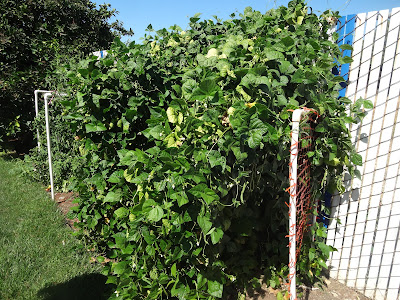The other garden friend's garden I grew in during 2019 was a plot that contains soil enriched with large amounts of compost. This is what I simply refer to as the Fertile Garden.
By following some of what the owner of the fertile garden does, I can work to make my own backyard garden better. One technique that the Fertile Garden owner utilizes to maintain fertility is grow plants that produce much of their own nitrogen. Legumes such as peas and beans require minimal, if any fertilization.
Here are a few pictures of spring peas being grown in the Fertile Garden:
My friend also really enjoys pole beans. This year he grew out a couple stands of Blue Lake Pole Beans. He said that his favorite things about them is that they are stringless. One thing I noticed about them is how long they lasted.
Though they lasted a whole long time, by the time they were done, the plants looked very tired out. This is quite a contrast with the kinds of poles I used to grow. I am used to having grown Chinese Long or Asparagus beans. Chinese Long beans have nectaries which attract ants and other insects. The ants will sip the nectar and protect the plant from many predators (if they can find them). Additionally, Chinese Long Beans plants do not deteriorate as quickly as regular pole bean plants. Unfortunately, Chinese Long Beans are not as versatile or palatable as regular pole beans.
These pole beans lasted until the later fall. I suppose they would last as long as the gardener picks the pods off of the plant - or until the first frost.
By following some of what the owner of the fertile garden does, I can work to make my own backyard garden better. One technique that the Fertile Garden owner utilizes to maintain fertility is grow plants that produce much of their own nitrogen. Legumes such as peas and beans require minimal, if any fertilization.
Here are a few pictures of spring peas being grown in the Fertile Garden:
My friend also really enjoys pole beans. This year he grew out a couple stands of Blue Lake Pole Beans. He said that his favorite things about them is that they are stringless. One thing I noticed about them is how long they lasted.
Though they lasted a whole long time, by the time they were done, the plants looked very tired out. This is quite a contrast with the kinds of poles I used to grow. I am used to having grown Chinese Long or Asparagus beans. Chinese Long beans have nectaries which attract ants and other insects. The ants will sip the nectar and protect the plant from many predators (if they can find them). Additionally, Chinese Long Beans plants do not deteriorate as quickly as regular pole bean plants. Unfortunately, Chinese Long Beans are not as versatile or palatable as regular pole beans.
These pole beans lasted until the later fall. I suppose they would last as long as the gardener picks the pods off of the plant - or until the first frost.










I grew fava beans this past winter on an experimental basis. They do well here in Southern California during that season. I harvested and froze a lot and the soil where they grew is now producing basil for making pesto.
ReplyDeleteI have a friend from the Azores that provided me with some recipes her family used. She also gave me seeds of Portuguese kale that have been passed down through her family. I am interested in growing crops that don't require winter irrigation or at least minimal watering here. I am harvesting barley I grew as well as the favas. I am planning on planting a lot of peas this upcoming fall/winter season. I also will plant the kale as well as a lot of root crops.
Thank you for sharing Philip!
DeleteI also like growing Favas over the winter, though I haven't really figured out the cooking part.